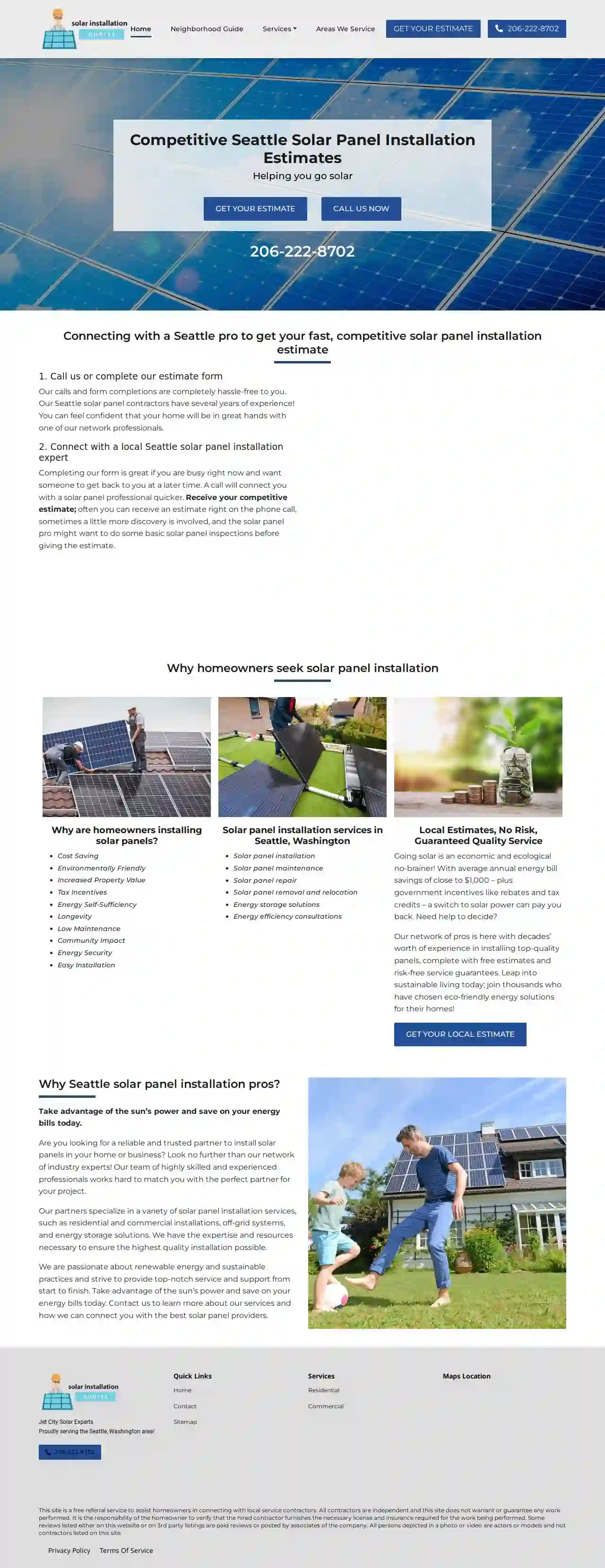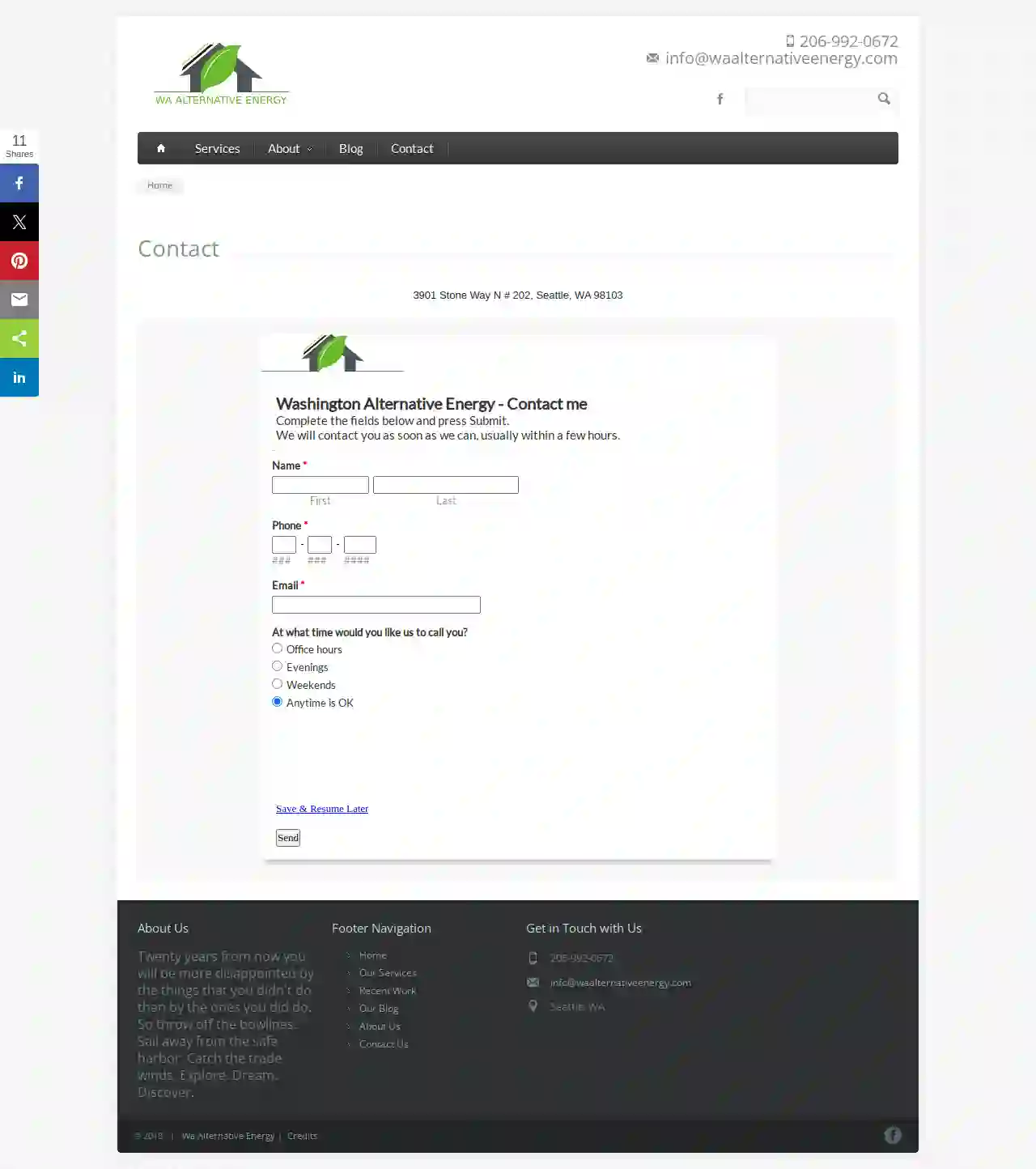Solar Installers Ridgefield
Find top Solar Panel Installer in Ridgefield
Get 3 FREE Solar Panel Installer quotes for your project today! Compare profiles, reviews, accreditations, portfolio, etc... and choose the best offer.

Artisan Electric
4.896 reviews969 S Nebraska Street Suite A, 98108, USArtisan Electric Inc. is a solar energy provider specializing in solar panel installation across Seattle, WA. They offer a full-service turn-key approach to solar panel systems, leveraging cutting-edge products from top brands in the solar industry. Their team of skilled, professionally licensed journeyman electricians and installation specialists set industry standards for quality, design, and customer service.
- Services
- Why Us?
- Accreditations
- Our Team
- Gallery
Get Quote
Northwest Electric and Solar
4.9161 reviews18001 73rd Ave NE, Kenmore, 98028, USNorthwest Electric and Solar is a leading solar contractor in Washington State, specializing in designing and installing state-of-the-art solar panel systems. Founded in 2011 by Master Electrician Derek White, the company is driven by setting the standard for excellence and providing the highest quality solar solutions tailored to unique needs. The company offers a suite of renewable energy and electrical services, including solar, EV charging, battery backup, SPAN, Tesla Solar Roof, and electrical services. Northwest Electric and Solar is an NABCEP-accredited company, ensuring the highest level of customer satisfaction through continuous training and expertise.
- Services
- Why Us?
- Accreditations
- Our Team
- Gallery
Get Quote
West Seattle Electric and Solar
4.431 reviewsWest Seattle, Seattle, 6921 34th Ave SW, 98126, USWest Seattle Electric and Solar is a family-run business dedicated to providing high-quality electrical work and renewable energy solutions. Founded by Keith Hughes, a veteran and former IT infrastructure engineer, the company aims to deliver premium work, manage schedules efficiently, and ensure 100% customer satisfaction. With a team of 11, they offer services including electrical repairs, installations, and solar energy solutions.
- Services
- Why Us?
- Accreditations
- Our Team
- Testimonials
- Gallery
Get Quote
Jet City Solar Experts
4.714 reviews123 Solar Way, Suite 100, Seattle, 98101, USCompetitive Seattle Solar Panel Installation Estimates. Helping you go solar. Get Your Estimate. Call Us Now. 206-222-8702. Connecting with a Seattle pro to get your fast, competitive solar panel installation estimate. 1. Call us or complete our estimate form. Our calls and form completions are completely hassle-free to you. Our Seattle solar panel contractors have several years of experience! You can feel confident that your home will be in great hands with one of our network professionals. 2. Connect with a local Seattle solar panel installation expert. Completing our form is great if you are busy right now and want someone to get back to you at a later time. A call will connect you with a solar panel professional quicker. Receive your competitive estimate; often you can receive an estimate right on the phone call, sometimes a little more discovery is involved, and the solar panel pro might want to do some basic solar panel inspections before giving the estimate. Why homeowners seek solar panel installation. Why are homeowners installing solar panels? Cost Saving. Environmentally Friendly. Increased Property Value. Tax Incentives. Energy Self-Sufficiency. Longevity. Low Maintenance. Community Impact. Energy Security. Easy Installation. Solar panel installation services in Seattle, Washington. Solar panel installation. Solar panel maintenance. Solar panel repair. Solar panel removal and relocation. Energy storage solutions. Energy efficiency consultations. Local Estimates, No Risk, Guaranteed Quality Service. Going solar is an economic and ecological no-brainer! With average annual energy bill savings of close to $1,000 – plus government incentives like rebates and tax credits – a switch to solar power can pay you back. Need help to decide? Our network of pros is here with decades’ worth of experience in installing top-quality panels, complete with free estimates and risk-free service guarantees. Leap into sustainable living today; join thousands who have chosen eco-friendly energy solutions for their homes! Get Your Local Estimate. Why Seattle solar panel installation pros? Take advantage of the sun’s power and save on your energy bills today. Are you looking for a reliable and trusted partner to install solar panels in your home or business? Look no further than our network of industry experts! Our team of highly skilled and experienced professionals works hard to match you with the perfect partner for your project. Our partners specialize in a variety of solar panel installation services, such as residential and commercial installations, off-grid systems, and energy storage solutions. We have the expertise and resources necessary to ensure the highest quality installation possible. We are passionate about renewable energy and sustainable practices and strive to provide top-notch service and support from start to finish. Take advantage of the sun’s power and save on your energy bills today. Contact us to learn more about our services and how we can connect you with the best solar panel providers.
- Services
- Why Us?
- Accreditations
- Our Team
- Testimonials
- Gallery
Get Quote
Sphere Solar Energy
4.873 reviewsSeattle, WA, 9520 Roosevelt Way NE, 98115, USOur mission is to make clean energy systems more accessible throughout the Northwest and in developing communities abroad so that a greater number of individuals can power their homes and their lives in a way that does not harm the environment and future generations.
- Services
- Why Us?
- Accreditations
- Our Team
- Testimonials
- Gallery
Get Quote
Smart Solar Energy Seattle Washington
53 reviews123 Solar Way, Portland, 97201, USSmart Solar Energy is a green energy company that specializes in providing residential and commercial solar energy services. They offer solar panel installation, solar incentives, and solar audits. Their services aim to help homeowners and businesses become more environmentally friendly while saving money on utility bills and increasing property values. They provide financial incentives for switching to solar energy and offer various guarantees including labor warranty, solar panel warranty, real-time monitoring, production guarantee, solar inverter warranty, and project support.
- Services
- Why Us?
- Accreditations
- Our Team
- Testimonials
- Gallery
Get Quote
NW Wind & Solar
4.211 reviewsConcord, ON, Canada, 20 Floral Parkway, Toronto, L4K 4R1, USOZZ Electric specializes in large-scale projects, high profile design-build work, retrofit applications, and clean energy solutions. They provide full service in the residential, industrial, commercial, and institutional (ICI) spaces. Their work is based on a philosophy of service and technical excellence, building positive long-term customer relationships and enduring industry partnerships.
- Services
- Why Us?
- Accreditations
- Our Team
- Testimonials
- Gallery
Get Quote
Sun Path Electric
530 reviewsSeattle, WA, 309 South Cloverdale Street, 98108, USSun Path Electric is a top-quality local solar installer in Seattle, offering a comprehensive solar installation journey. They provide a step-by-step process, including sun analysis, consultation, permitting, installation, activation, and ongoing support. Sun Path Electric also supports the environment by making a donation to their solar partner, Barefoot College - Solar Mamas, for every solar panel installation. They believe in the importance of renewable energy and its benefits for both homeowners and the environment.
- Services
- Why Us?
- Accreditations
- Our Team
- Testimonials
- Gallery
Get Quote
Wa Alternative Energy
3901 Stone Way N # 202, Seattle, 98103, USSolar Energy Systems for Homes & Businesses. We install solar energy systems in homes and businesses. All rebates go directly to the homeowner. Will you join us and be part of the environmental recovery? Our solar energy system will increase the value of your home. Our solar energy system pays for itself. Imagine having no electricity bills for the rest of your life. A long hot shower will feel more welcoming than ever!
- Services
- Why Us?
- Accreditations
- Our Team
- Testimonials
- Gallery
Get Quote
Puget Sound Solar LLC
4.858 reviews805 Rainier Ave. S., Seattle, Washington, 98144, USPuget Sound Solar LLC is a leading provider of solar energy solutions in Seattle, Washington. Since 2001, they have been dedicated to providing top-quality services to both residential and commercial clients. Their mission is to offer the best warranties in the industry, including a 25-year workmanship guarantee, a 10-year performance guarantee, and a 10-year equipment labor warranty. They use advanced lidar imaging technology to provide accurate preliminary quotes and ensure transparency in their design-oriented solutions.
- Services
- Why Us?
- Accreditations
- Our Team
- Testimonials
- Gallery
Get Quote
Over 4,210+ Solar Businesses in our network
Our solar companies operate in Ridgefield and beyond!
SolarCompaniesHub has curated and vetted the Best Solar Contractors in Ridgefield. Find the most reliable contractor today.
Frequently Asked Questions About Solar Installers
- Your current energy usage
- The size of your solar system
- Your local electricity rates
- The amount of sunlight your panels receive
- Available net metering policies
- Keep Panels Clean: Clean panels periodically to remove dirt, debris, and bird droppings, which can reduce efficiency. Rainfall usually cleans panels adequately, but you might need to hose them down occasionally.
- Visual Inspections: Regularly inspect panels for signs of damage, loose wiring, or other issues.
- Professional Maintenance: Consider having a professional solar installer inspect your system every few years to ensure optimal performance.
- System size (measured in kilowatts, or kW)
- Type of solar panels (monocrystalline, polycrystalline, thin-film)
- Roof complexity (pitch, size, obstructions)
- Labor costs in your area
- Available incentives and rebates
- Solar Panel Warranty: From the panel manufacturer, typically covering defects in materials and workmanship for 10-25 years. Some manufacturers offer performance guarantees, ensuring a certain level of energy output over time.
- Solar Installation Warranty: From the solar installer, covering the quality of the installation work for 1-10 years. This warranty protects you from leaks, faulty wiring, or other issues caused by improper installation.
How much can I save on my electricity bill with solar panels?
How do I maintain my solar panels?
What is the average cost of solar panel installation in USA?
What kind of warranty should I expect for my solar panel system?
How much can I save on my electricity bill with solar panels?
- Your current energy usage
- The size of your solar system
- Your local electricity rates
- The amount of sunlight your panels receive
- Available net metering policies
How do I maintain my solar panels?
- Keep Panels Clean: Clean panels periodically to remove dirt, debris, and bird droppings, which can reduce efficiency. Rainfall usually cleans panels adequately, but you might need to hose them down occasionally.
- Visual Inspections: Regularly inspect panels for signs of damage, loose wiring, or other issues.
- Professional Maintenance: Consider having a professional solar installer inspect your system every few years to ensure optimal performance.
What is the average cost of solar panel installation in USA?
- System size (measured in kilowatts, or kW)
- Type of solar panels (monocrystalline, polycrystalline, thin-film)
- Roof complexity (pitch, size, obstructions)
- Labor costs in your area
- Available incentives and rebates
What kind of warranty should I expect for my solar panel system?
- Solar Panel Warranty: From the panel manufacturer, typically covering defects in materials and workmanship for 10-25 years. Some manufacturers offer performance guarantees, ensuring a certain level of energy output over time.
- Solar Installation Warranty: From the solar installer, covering the quality of the installation work for 1-10 years. This warranty protects you from leaks, faulty wiring, or other issues caused by improper installation.